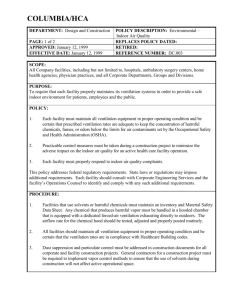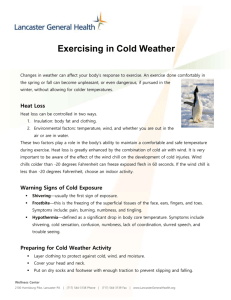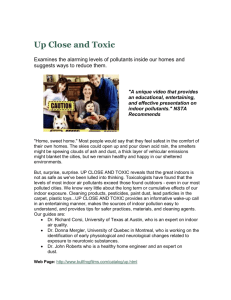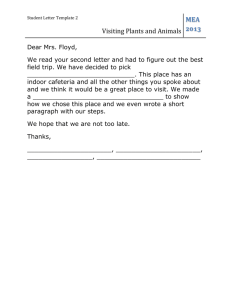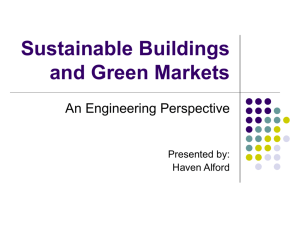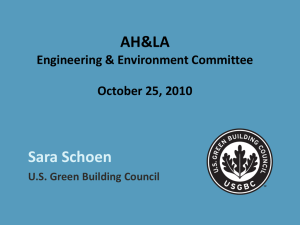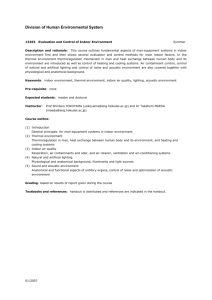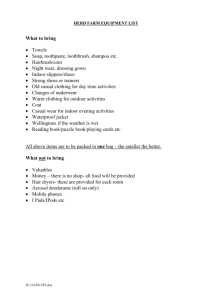LEED FOR LABS (Future)
advertisement
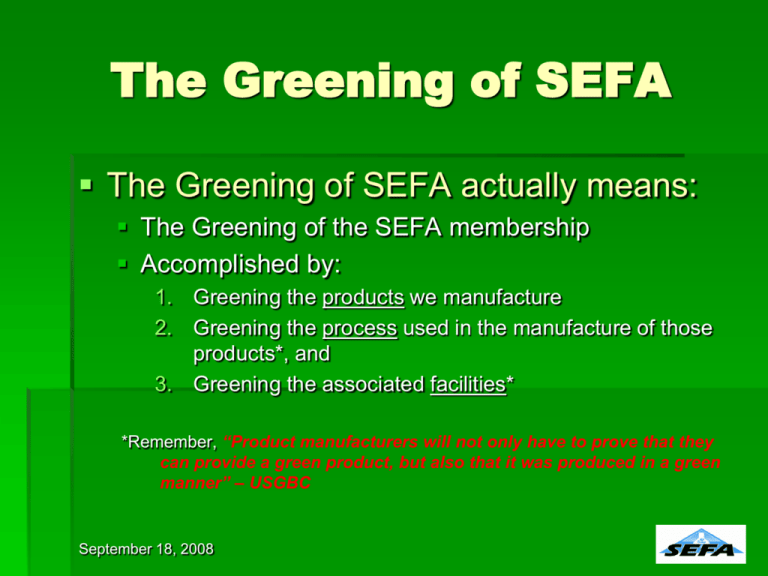
The Greening of SEFA The Greening of SEFA actually means: The Greening of the SEFA membership Accomplished by: 1. Greening the products we manufacture 2. Greening the process used in the manufacture of those products*, and 3. Greening the associated facilities* *Remember, “Product manufacturers will not only have to prove that they can provide a green product, but also that it was produced in a green manner” – USGBC September 18, 2008 Our Products Within our US membership I count: 3 - Manufacturers of Flexible systems 7 - Wood Casework manufacturers 11 - Steel Casework Companies 5 - p/lam Casework Companies 20 - Ventilation Equipment Manufacturers 4 - Service fixture companies 5 - Worksurface companies September 18, 2008 LEED-AGL Purpose Customizes credit criteria to be project type specific LABS! Deletes credits that do not apply to the vertical market Adds new credits? September 18, 2008 EPC 2.0 DEVELOPERS Daniel Arons Tsoi/Kobus Architects Karl Aveard * Earl Walls Associates Larry Boyer TerraFirma Environmental Nancy Carlisle National Renewable Energy Lab Colin Cathcart Kiss + Cathcart, Architects Victoria David * Maynard/David Partnership John DeLahunt * The Colorado College David Drummond *Univ of Wisconsin - Madison Marc Estra Bristol-Myers Squibb James Fraley Earl Walls Associates Darren Fritsch Vanderweil Engineers Charles Garnett * Flad & Associates Steve Hackman HERA Inc. William Lintner U.S. DOE Mike MacDonald * Oak Ridge National Laboratory Garrick Maine Flad & Associates Dennis Maloskey * Brinjac Engineering, Inc. Itzhak Maor PWI-Energy Paul Mathew * Lawrence Berkeley National Lab Charlotte Matthews* Steven Winter Associates Derek McGarry McCracken & Lopez, PA Jennifer Melton * Kling Lindquist *drafted credit criteria November 9, 2004 Jack Mizner The IT Corporation Richard Mohr Flad & Associates Scott Moll * Affiliated Engineers, Inc. Robert Morris Configuration Management Jim Nicolow Lord, Aeck & Sargent Julie Paquette Vanderweil Engineers Don Posson * Kling Lindquist Richard Rittelmann*Burt Hill Kosar Rittelmann Don Rosen Einhorn Yaffee Prescott A&E Dale Sartor Lawrence Berkeley National Lab Jeffrey Schantz Lord Aeck Sargent Roy Sieber * ERG, Inc. William Starr UC Davis John Swift Einhorn Yaffee Prescott A&E Eric Truelove IBC Engineerng Services, Inc. Otto VanGeet National Renewable Energy Lab Mike Walters * Affiliated Engineers, Inc. John Weale Rumsey Engineers, Inc. Pat Weggel U.S. EPA Robert Weidner Brinjac Engineering, Inc. Alexander Wing * Burt Hill Kosar Rittelmann Phil Wirdzek U.S. EPA LEED-AGL Sustainable Sites 1 NEW credit Water Efficiency 1 NEW credit Energy& Atmosphere 1 NEW Prerequisite 1 NEW Credit Modified 1 Prerequisite Modified 3 Credits September 18, 2008 Materials & Resources Modified LEED calculation affecting 3 Credits Modified 1 Credit Indoor Environmental Quality 1 NEW Prerequisite 3 NEW Credits Modified 4 Credits Innovation & Design LEED-AGL Water Efficiency Prerequisite 1: Laboratory Equipment Water Use Intent Reduce water use for laboratory equipment September 18, 2008 LEED-AGL Water Efficiency Requirements Prerequisite 1.0 No domestic water shall be used “oncethrough” for any laboratory equipment cooling unless the use is less than 2 gpm. Technologies and Strategies Use closed-loop cooling water for equipment cooling instead of open-loop (once through). Use non-potable water sources. Use vacuum pumps instead of aspirator fittings at cold-water faucets. One way to discourage this is to specify the use of non-threaded faucets, unless threaded faucets are required for other laboratory function September 18, 2008 LEED-AGL Water Efficiency Credit 4 Process Water Efficiency Intent Reduce process water use and process wastewater generation. September 18, 2008 LEED-AGL Water Efficiency Credit 4.1 (1 point): Adopt technologies and strategies to reduce process water use and process wastewater generation by 20%. Document the reductions from baseline. Credit 4.2 (1 point): Adopt technologies and strategies to reduce process water use and process wastewater generation by 30%. Document the reductions from baseline. November 9, 2004 LEED-AGL Energy & Atmosphere EA Pr 4: Assess Minimum Ventilation Requirements (New prerequisite) Intent To determine minimum ventilation requirements in laboratories based on user needs, health/safety protection and energy consumption . LEED-AGL Energy & Atmosphere Requirements The ventilation requirements shall be determined by a team of the following professionals: A/E Team, Laboratory Consultants*, User Representative, Facilities Maintenance, Owner Environmental Health & Safety, Commissioning Agent Determine the necessary fresh air ventilation rate based on applicable codes and standards and the planned use of the laboratory over the next 5 years. Consider exhaust alternatives to fume hoods Develop a workable fume hood sash management plan LEED-AGL Indoor Environmental Quality EQ Pr 3: Laboratory Ventilation (New LEED AGL Prerequisite) Intent Ensure that minimum requirements for safety and worker protection are met with worker comfort as an important but secondary requirement. LEED-AGL Indoor Environmental Quality Requirements: Meet the minimum requirements of the following sections of ANSI/AIHA Z9.5 (latest version). Chapter 2 - Laboratory Ventilation Management Program in the design process. Chapter 3 - Laboratory Chemical Hoods Chapter 4 - Other Containment Devices as they apply to selection of equipment and accessories. Exclude 4.1.10 Decontamination because it is an operational Chapter 5 - Laboratory Ventilation System Design Chapter 9 - Air Cleaning (all subsections) Appendix 5 - Laboratory Ventilation Management Plan LEED-AGL Indoor Environmental Quality EQ 4.2: Low Emitting Materials - Paints and Coatings (Modification of the existing LEED credit) Intent Reduce the quantity of indoor air contaminants that are odorous, potentially irritating and/or harmful to the comfort and well-being of installers and occupants See Rational next slide LEED-AGL Indoor Environmental Quality Requirements: VOC emissions from paints and coatings must not exceed the VOC and chemical components limits of Green Seal’s Standard GS-11 requirements. VOC content limits for laboratory specific coating such as epoxy floors and wall shall comply with AQMD rule 1113: Architectural coatings. Rationale for Modification Credit needs to address materials and products that are unique to the laboratory environment such as epoxy floors, floor sealers and other materials that might not meet Green Seal requirements. LEED-AGL Indoor Environmental Quality EQ 5: Indoor Chemical and Pollution Source Control (Modification of the existing LEED credit) Intent Avoid exposure of building occupants to potentially hazardous chemicals that adversely impact air quality LEED-AGL Indoor Environmental Quality Requirements Minimize pollutant cross-contamination Permanent entryway systems Provide segregated areas with deck to deck partitions with separate outside air exhaust Provide chemical storage cabinets that are vented to the outside where applicable. Do not use chemical fume hoods as ventilated storage. Drains plumbed for appropriate disposal of liquid waste in spaces where drain disposal may occur. Do not specify and/or install localized chemical neutralization tanks within the occupied lab space. LEED-AGL Indoor Environmental Quality EQ 9.1: Indoor Environmental Safety – Airflow Modeling (New LEED AGL credit) Intent Ensure health and safety of employees LEED-AGL Indoor Environmental Quality EQ 9.2: Indoor Environmental Safety – Fume Hood Commissioning (New LEED AGL credit) Intent Ensure health and safety of employees LEED-AGL Indoor Environmental Quality EQ 9.3: Indoor Environmental Safety – Alarms Systems (New LEED AGL credit) Intent Ensure health and safety of employees LEED-AGL Indoor Environmental Quality EQ 9.3: Indoor Environmental Safety – Alarms Systems (con’t) Common building and fixed equipment alarms in laboratories include: Fire alarm Fume hood alarms instrument exhausts dedicated exhausts for biosafety cabinets Pressure balance alarms for areas that must be negative or positive to adjacent areas Air supply or general exhaust failure alarms Intrusion alarms Freezers, incubators, autoclaves and other fixed equipment equipped with temperature, pressure or other alarms Hazardous gas detectors Working Towards the Greening Your Facilities • SEFA is going GREEN. As a SEFA member, each of us can set an example by leading the way to GREENER company. • GREEN companies and organizations are ones who take the reins of LEEDership for the sustainable future Polish & Elevate the Company Brand Reduce Operating Costs Reduce Product manufacturing Costs Create an image of the SEFA membership companies as first class environmental custodians in the eyes of our customers, our vendors, our employees the architects and the owners in the Action Set One: “The Low Hanging Fruit” Action Set Two: “All the Remaining” Low Hanging Fruit 1) Establish Goal for Improvement 2) Write a SEFA “GREEN Policy Document” to Include the Following: Low Hanging Fruit Heating Management Plan to include: Room Temperature Limits Off Hour Settings No Portable Heaters except when authorized Cooling Policy Plan to include: Implement Room Temperature Limits Off Hour Settings Reheat Operation if applicable Low Hanging Fruit Lighting Survey & :oghting Reduction Plan Eliminate All Incandescent Lamping Use Natural Light Where Possible Turn Off Unused or Unneeded Lights When repainting use light colors Use Fluorescent Task Lighting Where Appropriate Windows and Doors – Keep closed in air conditioned and heated areas. Low Hanging Fruit Reduce Paper Waste Print & Copy as little as possible When you must print, consider doing it double sided Edit on screen not on paper Save to disk instead of printing on paper Do not routinely print e-mails Consider recycled paper Low Hanging Fruit GREEN Computing Keep computers off unless they are in use Turn off printers, especially laser printers, unless printing Minimize use of screen savers in lieu of the computer’s power management features Low Hanging Fruit Other Equipment like vending machines, fans, etc. Insist on equipment with the Energy Star rating Go digital
